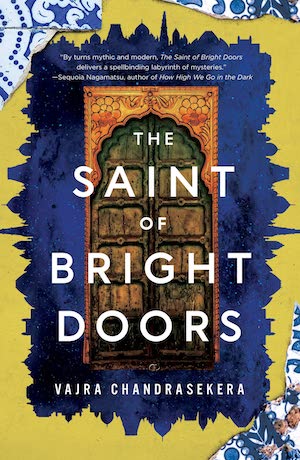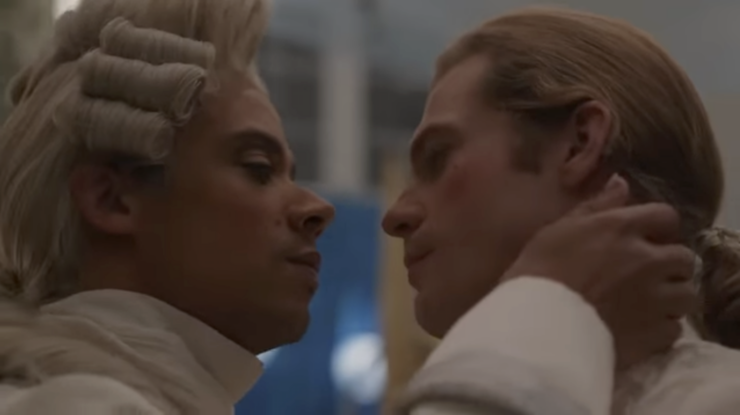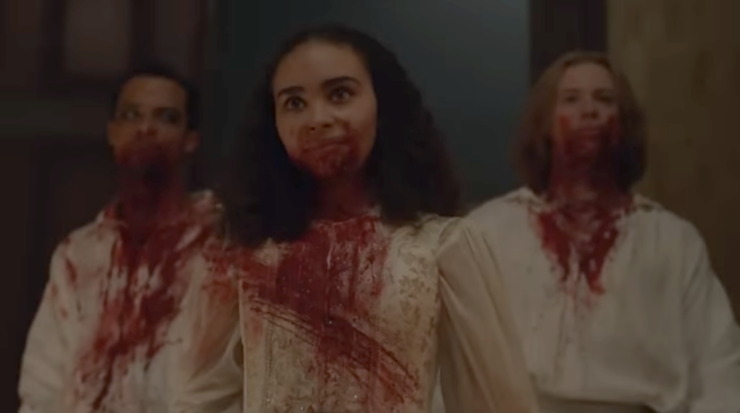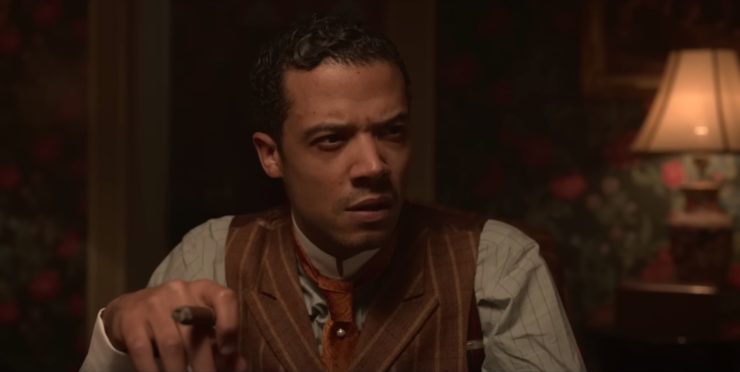“For the first time in my life, I was seen.”
With these words, AMC’s Interview with the Vampire thrusts us into the gothic, twisted romance of vampire husbands Lestat de Lioncourt and Louis de Point du Lac—one of the world’s most iconic, queer vampire relationships.
Interview with the Vampire is the first book in the Vampire Chronicles, a thirteen book (yes, you read that correctly) series by Anne Rice, which began in 1976. The novel follows Louis, a vampire who inflicts his life story upon a young journalist called “the boy”, later named as Daniel Molloy. Louis recalls a life spanning long, distraught decades, filled with loving and losing the famous French vampire named Lestat, adopting Claudia, a young girl who they bring into cursed immortality with them, and eventually finding his way to Paris, where things go from bad to worse. It is an emotional, sensual gothic horror novel that looks deeply into what it means to be a monster, what it means to be human, and is deliciously queer.
Despite being a major title in the gothic horror genre, there’s been some argument as to whether Interview with the Vampire can truly be considered a quintessential queer gothic horror novel. This is probably because blatant declarations of queerness occur later in the series, after Interview with the Vampire—after many modern readers gave up and decried that subtext was not enough for them.
The 1994 adaptation certainly did not help. It never defines the nature of Lestat and Louis’s relationship, nor Louis and Armand’s. Its representation of race is no better: after Louis dramatically frees his slaves, we never see another Black person again.
Buy the Book


The Saint of Bright Doors
When AMC announced their plans for a TV show, I assumed their adaptation would remain as close to the book as the 1994 film had. Imagine my surprise when I learned that AMC’s show was not only set in the early 20th century, but that Louis and Claudia were being played by Black actors.
As a Black, queer fan of the book, I was skeptical about this. Interview with the Vampire is many things—gothic, haunting, lyrical, emotional—but “conscientious about race” is not one of them. In the novel, Louis is a slave owner, and all the Black characters are enslaved, preyed upon by Lestat, and completely disappear after the characters leave the plantation.
I was skeptical about the production team’s ability to portray a faithful queer relationship, and even less hopeful about their ability to portray a Black, queer man in a toxic, abusive romance with a white, queer man with substantially more power than him. The issue of being seen is one deeply entrenched in every queer person of color I know. It is so incredibly rare to see the experience of the double bind of racism and homophobia portrayed well.
Ironically, it is this very topic—the topic of sight—that lies so centrally to AMC’s Interview with the Vampire. It is truly an adaptation in every sense, as it expands on the themes and relationships in the novel with new, modern insight. It cannot be divorced from its queerness (unlike the film) nor its Blackness (unlike the novel). Despite this, it manages to remain in conversation with both because, here, it is the power of being seen that matters most.

This adaptation does not fear the blatant queerness of its source material. Any fan of the Vampire Chronicles will tell you that the queer relationships are the beating heart of the series. AMC’s Interview is spiritually in keeping with this: it is Louis and Lestat’s love story, embracing all of its yearning, vampiric coffin sex, and messy, tragic violence.
Framed as a response to both the film and the novel—the first episode establishes that this is Daniel’s second time interviewing Louis, which parallels the fans’ experience, since it’s our second time watching an adaptation—you can feel the conversation the adaptation is having with both the novel and the 1994 film.
AMC’s Interview is the story of Louis coming to terms with his sexuality, of trying—and failing—to build a family for himself after losing his own, something that is so resonant for many queer viewers. Even the source of Louis and Daniel’s relationship is queer, as the two met while flirting in a gay bar in the 1970’s (in keeping with the original short story Anne Rice wrote about Interview, before she expanded it into a novel).
Instead of being enslaved, here the Black characters are given center stage. The season follows Louis’s pushing back against rich white men who exploit his labor, with his grieving family, with raising Claudia as a young Black woman, and even with Lestat. Claudia, too, learns to navigate the world as she comes-of-age, both as a Black woman and as a vampire. The Black characters are no longer a negligible part of the story, they are the story.
In this Bridgerton-era of colorblind casting, the relevance of Louis and Claudia’s experience as Black people—and Louis’s experience as a queer Black man—is refreshing. Never has the power imbalance between Louis and Lestat been more textual. Louis’s struggle to find himself in a world where he knows one other queer, Black man, is one that is intimately familiar to queer people of color, especially queer Black people. The pilot episode sees him rushing headfirst into a relationship with Lestat, who sees him for the man that he is—trapped in the double bind of racism and homophobia alike, forced to play a palatable role to survive the expectations of a white, heteronormative world. This is the double bind that Lestat frees Louis from. It is seductive, it is rich. It will be his undoing.
Louis and Claudia’s Blackness alienates them from Lestat, while deepening their bond to each other. Louis’s newfound power as a vampire directly informs the way he pushes back to racism. This isn’t the “colorblind casting” that has become so popular within recent “diverse” works—this is an adaptation that genuinely wants to explore the Black queer experience, adding a new complexity to the power struggles between the trio that makes up this strange, toxic vampire family.

While Claudia’s own voice leaves much to be desired, with her own words in her diary often being ripped out, it is clear that the series wants to dig into these questions of power and of voice. Who decides who gets to be seen? How do we decide how much of another is seen? Is it another person’s place to decide how much of another person can be seen by the world?
To see, to truly see, is to know. And to be seen, to truly be seen, is to be known. And what is more beautifully tragic than the mortifying ordeal of being known? To be seen and loved in tandem—what more can any of us desire? What violence would we forgive to be seen and, in that same moment, to be loved?
Ultimately, I see AMC’s adaptation as more than a modernization. It is in direct conversation with the novel and the 1994 adaptation. More importantly, it’s daring to go where its predecessors did not. It expands and modernizes the themes of the novel—questions of desire, power, intimacy, what it means to love and be loved in return.
I read Interview with the Vampire for the first time when I was thirteen, and I’ve been in love with the series ever since. I was a grieving, depressed, queer girl and, ironically, the books made me feel seen. These are the themes I am so glad to see presented in AMC’s adaptation, so gloriously explored and given the weight and power they deserve.
Interview with the Vampire will always be the perfect gothic horror love story. It is beautifully messy, it is brilliantly horrific—because isn’t love, at its core, always a little terrifying?
Interview with the Vampire will always have my heart. It understands, so intimately, the dangerous ordeal of being known.
Ashia Monet is a novelist and essayist from Pennsylvania. As a lifelong fan of myth and poetry (especially Sappho), her fantasy novels explore various forms of magic and monsters. Online, she’s @ashiamonet on Twitter and @ashiawrites on Instagram and Tiktok. Her website is ashiamonet.com.










